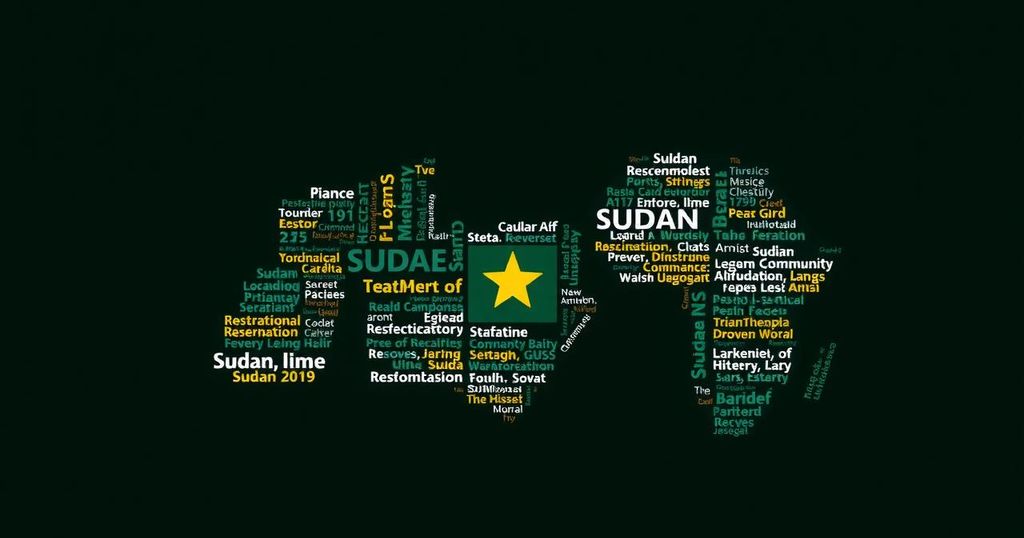Sudan Emerges as Key Focus in US-UAE Diplomatic Discussions
Recent US-UAE discussions have highlighted Sudan as a primary focus, surprising observers who expected talks to center on conflicts such as Russia-Ukraine or Gaza. Journalist Mohamed Hereika noted the significance of the UAE being named a major US defense partner while stressing the need for a peaceful resolution to the Sudan crisis amidst accusations against the UAE concerning support for paramilitary factions.
In a recent discussion regarding US-UAE diplomatic efforts, journalist and political analyst Mohamed Hereika expressed astonishment at the focus on Sudan during meetings between US President Joe Biden, Vice President Kamala Harris, and UAE President Mohammed Bin Zayed. Traditionally, one might expect discussions on pressing issues such as the Russia-Ukraine war or the conflict in Gaza. Hereika emphasized the importance of the United States designating the UAE as a “major defense partner” during these discussions. Both parties acknowledged the lack of a military solution to the ongoing crisis in Sudan, asserting the necessity for immediate actions to cease hostilities and restore civilian governance. Despite existing tensions from certain factions within the Sudanese government towards the UAE, Hereika noted a congruence between US and UAE positions on the Sudanese conflict. He stated that the UAE has actively advocated for a peaceful resolution, particularly in regard to the plight of Sudanese refugees in Chad. A notable video circulating on social media featured a refugee appealing for the UAE to stop its support for the paramilitary Rapid Support Forces (RSF). Addressing the allegations of UAE support for the RSF, Hereika remarked that while international organizations have cautioned against interference in the region, they have not directly pointed fingers at the UAE. He expressed surprise that, amidst increasing accusations from Sudan, the diplomatic relationship between the country and the UAE continues to remain strong. Hereika raised questions about the UAE’s capacity to act as a mediator in the Sudan crisis given the accusations leveled by the Sudanese Armed Forces, which have led to their withdrawal from recent talks in Geneva. He strongly advocated for dialogue as the only viable pathway to resolution, asserting, “All wars eventually end at the negotiating table,” and called for political actions to avert a humanitarian catastrophe. Both the United States and the UAE reiterated their commitment to a peaceful resolution in Sudan.
The Sudan conflict has been characterized by significant turmoil and violence, resulting in a humanitarian crisis that has affected millions, particularly with regards to civilian governance. Recently, the United States and the United Arab Emirates have engaged in discussions aimed at addressing this crisis while underscoring the importance of a diplomatic approach over military solutions. The designation of the UAE as a major defense partner by the US has implications for regional security dynamics, especially concerning its relationship with Sudan amidst allegations of supporting factions involved in the conflict. The ongoing efforts and concerns highlighted by analysts indicate a critical juncture for achieving stability in Sudan through collaboration and dialogue between international stakeholders.
In summary, the conversations between US and UAE leaders underscore a strategic pivot towards engaging in the Sudan crisis, emphasizing the necessity for diplomatic resolution and humanitarian aid. While allegations surrounding UAE’s support for the RSF complicate its role as a mediator, the collective stance of the US and the UAE reflects an urgent call for dialogue, reinforcing the belief that sustainable peace can only be achieved through negotiation. Hereika’s commentary provides a valuable perspective, highlighting the complexities and the potential for cooperative efforts in addressing Sudan’s challenges.
Original Source: www.dabangasudan.org




Post Comment